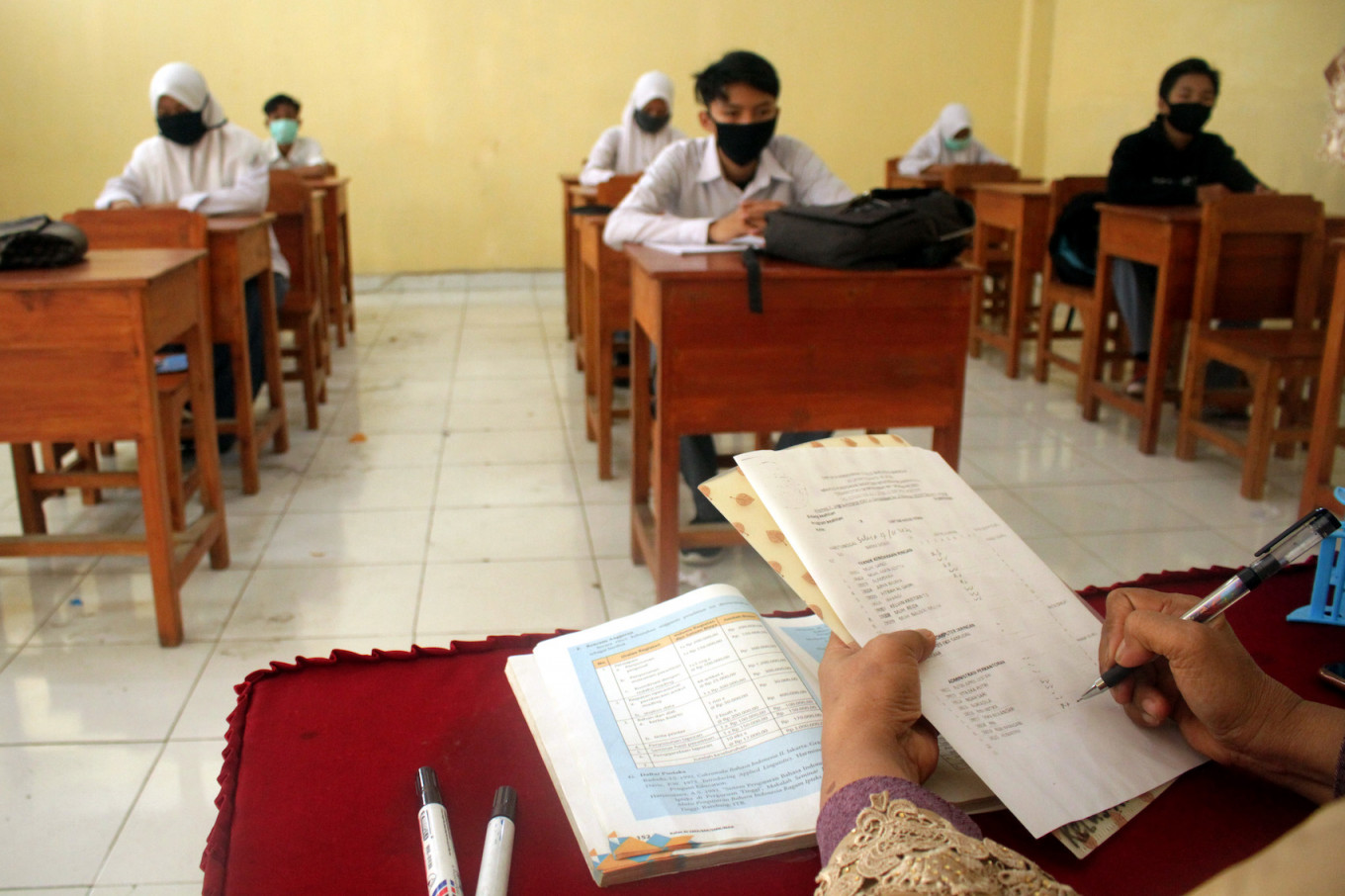Popular Reads
Top Results
Can't find what you're looking for?
View all search resultsPopular Reads
Top Results
Can't find what you're looking for?
View all search resultsRegional administrations to get discretion on school reopening
Nadiem said that regional administrations and regional religious affairs offices, school administrations including parents’ committees, as well as the parents themselves must agree before a school could begin face-to-face teaching.
Change text size
Gift Premium Articles
to Anyone
I
n the next month or two the government will give the power to local administrations, school administrations and parents to decide whether their schools should reopen for in-classroom teaching, taking into consideration the risks of COVID-19 transmission.
“The school reopening can be done immediately or in stages according to each region’s capability and the decision of their regional heads. The schools wanting to reopen must fulfill the checklist [requirements] for face-to-face teaching and health protocols,” Education and Culture Minister Nadiem Makarim said at an online press conference on Friday.
The policy is a major departure from the previous school reopening policy set out in June. Previously, only schools in green or yellow zones were allowed to conduct face-to-face teaching. The new policy allows schools in red zones to reopen.
Green zones are areas without active COVID-19 cases while yellow zones mean low-risk areas with controlled active cases and a red zone is an area with several active cases. The zoning is decided by the National Disaster Mitigation Agency (BNPB).
Nadiem said that the central government had received requests for school reopening from regional administrations, which argued that some of their administrative areas were safe enough for face-to-face teaching and were finding it difficult to conduct online learning.
He said there were several considerations on the negative impacts of online learning. Some of the impacts include students dropping out for economic reasons, decreasing early age school (PAUD) attendance rates, children being stressed from a lack of interaction with peers, as well as increasing rates of domestic violence.
Nadiem said that regional administrations and regional religious affairs offices, school administrations including parents’ committees, as well as the parents themselves must agree before a school could begin face-to-face teaching.
“However, parents can still opt out and not allow their children to take part in face-to-face schooling. The parent’s rights are still respected,” Nadiem stressed.
Schools seeking to reopen must follow several requirements including providing clean toilets, handwashing stations and disinfectant, access to nearby healthcare facilities, facemask enforcement and having the proper equipment for temperature checks.
“Schools must also know which students and teachers have comorbidities, access to safe transportation and have histories of travel from high risk COVID-19 areas or recent contact with COVID-19 cases,” Nadiem said.
Once reopened, schools must still follow several protocols including a distance of 1.5 meters within campus grounds, use of three-ply masks, regular handwashing and proper coughing and sneezing etiquette.
School capacity will also be limited to 50 percent, with PAUD only allowing five students per class, 18 students each class for elementary schools (SD), junior high schools (SMP) and senior high schools (SMA), and five for special schools for the disabled (SLB). Classes must also be conducted in shifts.
The formation of crowds will also be heavily discouraged, with school canteens, sports and extracurricular activities, as well as non-teaching activities, not permitted initially before eventual permission with proper health protocols.
Home Minister Tito Karnavian said that with the change of school reopening from simple risk zoning to regional administrations’ discretion, regional heads and their agencies must also prepare to prevent possible spikes in COVID-19.
“We cannot deny that we must take precautions in face-to-face learning so educational and religious [institutions] will not become new clusters [of COVID-19],” Tito said during the press conference.
Meanwhile, Religious Affairs Minister Fachrul Razi said the ministry welcomed the joint ministerial decision for school reopening, and would support it for religious schools under its authority.
National COVID-19 task force chief and BNPB head Doni Monardo said that regional administrations were the ones that knew best the situation in their regions and whether it was safe enough for schools to reopen. “Face-to-face teaching policy decided by regional administrations is the correct step as they are the ones who understand the situation well,” Doni said.
Indonesian Teachers Association (PGRI) chair Unifah Rosyidi welcomed the decision, saying that it was important for schools to eventually reopen just like other public spaces.
“We support this policy but we will need follow up regulations on how to conduct face-to-face teaching during a pandemic,” Unifah told The Jakarta Post over the phone on Friday.
Unifah said that the ministry should also enforce the emergency curriculum for reopened schools and prepare learning recovery strategies for the returning students. “The [central government] cannot just hand over the responsibility to regional administrations. They should have plans and designs [for face-to-face school learning amid the pandemic],” Unifah said.
Reopening will also be extended to higher learning institutions, with the details still being formulated by the ministry’s higher learning directorate general, Nadiem said.










